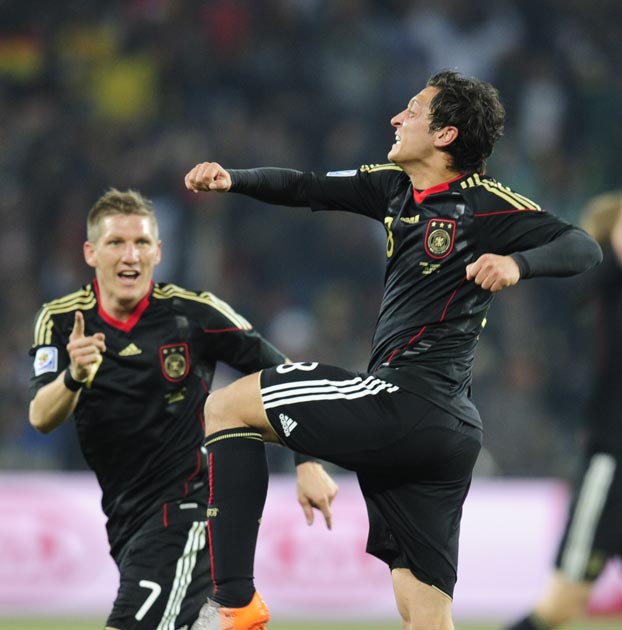Löw on the up: So just how good is the new-look Germany side?

Move over Ballack: this is a new cosmopolitan team
Joachim Löw says that after losing the final of Euro 2008 to Spain with an ageing side "it was clear we needed to rejuvenate". He has changed almost the half the squad in the ensuing two years and in particular has made use of the new cosmopolitan Germany to find players who would otherwise be qualified for eight other countries. This was a process begun by the various German youth teams, all of whom have been hugely successful in their various European tournaments.
Mesut Ozil, born in Gelsenkirchen, is typical as the son of Turkish "Gastarbeiter" (guest workers). Serdar Tasci, a defender yet to be used, is also of Turkish origin. Lukas Podolski and Miroslav Klose, older members of the squad, were both born in Poland. Also of eastern European extraction is midfielder Marko Marin, who was born in Bosnia-Herzogovina. Dennis Aogo was qualified for Nigeria, Sami Kedira for Tunisia and Jerome Boateng for Ghana. The clearest examples of the new international mix in the side, however, are the strikers Cacau, a naturalised German born in Brazil, and Mario Gomez, who has a Spanish father.
What we've learnt about them so far...
Qualifying
Finland held them twice, 3-3 and 1-1, but every other game was won. No mean feat considering Löw was in the process of rebuilding the side that were runners-up at Euro 2008 – nine of those players have now been replaced. Their low point was being booed off at half-time against Wales, early in the campaign, but they still won that match 1-0. Travelling to Moscow at the start of winter, Germany's 1-0 win was outstanding, and enabled them to finish four points clear of Guus Hiddink's Russians. Apart from those three goals in Helsinki, they conceded only two more in nine games.
What we learnt Flair can be in short supply
Efficiency rating 8/10
First group game: Beat Australia 4-0
Klose and Podolski are back with a bang. Klose had scored only three Bundesliga goals all season for Bayern Munich and Podolski was just as sluggish at Cologne. But each scored against a fairly poor Australian side that went down to 10 men. Ozil was dazzling, one of the starlets promoted from last summer's European Under-21 champions – he ran the midfield on his debut at the finals.
What we learnt Beware Ozil and the men up front
Efficiency rating 8/10
Second group game: Lost to Serbia 1-0
Per Mertesacker's lack of pace and slowness to pick up was exposed as Löw's side, albeit down to 10 men after Klose's red card, were beaten. Milan Jovanovic was left free in the six-yard box for just long enough to hook in a shot. Left-back Holger Badstuber also struggled badly.
What we learnt The defence has problems
Efficiency rating 6/10
Third group game: Geat Ghana 1-0
Needing a win to ensure their progress to the knockout stages, the Germans went for a quick kill, seeking that vital goal from the off. It made for an unexpectedly open-ended game and at times they rode their luck with again Mertsacker and sometimes Philipp Lahm at right-back left isolated. Löw's bold strategy finally paid off with Ozil's fine strike.
What we learnt Löw is prepared to gamble
Efficiency rating 7/10
Where they're strongest
The creativity of Ozil could cause England problems on Sunday. The playmaker will look to float passes behind Glen Johnson for Podolski to run onto. Ozil's shrewd distribution can also allow Klose to use his pace against England's central defenders.
Where they're vulnerable
As shown by the only goal they have conceded so far, against Serbia, the Germans are weak at left-back and in Mertsacker have a tall, ponderous centre-half slow to cover. This left Jovanovic to score from Nikola Zigic's knock-down after Badstuber had been outpaced. Mertsacker's partner, Arne Friedrich, is more reliable.
Subscribe to Independent Premium to bookmark this article
Want to bookmark your favourite articles and stories to read or reference later? Start your Independent Premium subscription today.

Join our commenting forum
Join thought-provoking conversations, follow other Independent readers and see their replies